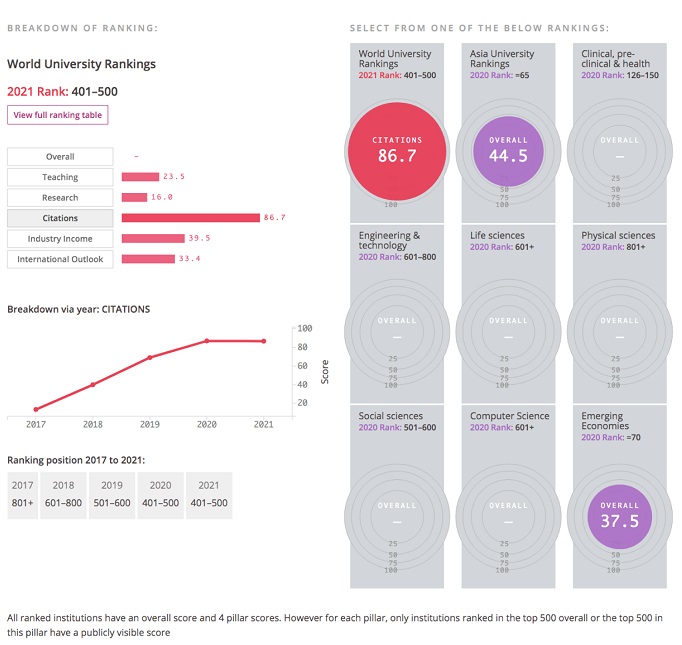UP retains rank in top 500
Jo. Lontoc, UP Media and Public Relations Office
The University of the Philippines (UP) retains its spot in a roster of the top 500 universities of the world. According to the 2021 Times Higher Education World University Rankings (THE-WUR), UP remains in the 401-500 bracket, after being assessed alongside 1,527 research-intensive universities.
The country’s national university maintained its overall rank despite the number of universities ranked this year increasing from last year’s 1,396. Overall, UP is ranked fifth among noted universities in Southeast Asia (SEA): National University of Singapore (NUS), Nanyang Technological University (NTU), University of Malaya, and the University of Brunei Darussalam.
UP garnered its highest score in the criterion of citations or global research influence, which accounts for 30% of its total score. THE-WUR comes out with the citation score by capturing the average number of times a university’s published work is cited by scholars globally. This year, bibliometric data supplier Elsevier examined 86 million citations from 2015-2020 across 13.6 million journal articles, article reviews, conference proceedings, books and book chapters published from 2015-2019. [View the Times Higher Education World University Rankings report for the University of the Philippines here.]

Breakdown of ranking for the University of the Philippines. Source: Times Higher Education
According to the THE, citations are a way of measuring a university’s role in spreading new knowledge and ideas and its contribution to the sum of human knowledge.
The other performance indicators are grouped into the areas of teaching (30%), research (30%), international outlook (7.5%), and industry income (2.5%).
UP Assistant Vice President for Academic Affairs Carla Dimalanta notes that UP outranks universities in neighboring countries in terms of research citation. Its score of 86.7 outperforms the 81.5 of NUS and the 83 of NTU, the top two ranking universities in the ASEAN region. Singapore’s NUS and NTU are ranked 25 and 47, respectively, in the World University Rankings.
“Our citation score is still a high 86.7, albeit down by a not so significant 0.2 points,” UP Vice President for Academic Affairs Ma. Cynthia Rose Bautista tells UP News. “It has been our strongest criterion, propelling UP to be among the top 500 universities in the world in the last 5 years. Interestingly, UP was among the top 10 universities in the world in terms of its citation score in the clinical, pre-clinical and health disciplines in 2020. Its score was higher than that of the top 10 universities in this field—the University of Oxford, Harvard University, University of Cambridge, Imperial College of London, Stanford University, University of Toronto, John Hopkins University, UCL UK, Yale University and Columbia University,” Bautista explained. THE’s 2021 world university ranking by subject has not yet been released.
UP is the first Philippine university to figure in the THE-WUR and the only one to break into its top 500. The national university first figured in the THE-WUR in its 2017 rankings where it placed in the 801+ bracket. It climbed to the top 601-800 in the 2018 rankings and to the top 501-600 in the 2019 rankings. UP then broke through to the top 500, within the 401-500 bracket, in the 2020 rankings.
UP’s jump into the top 500 has been powered mostly by its outstanding score in research citations or “influence in spreading new knowledge and ideas”. Its score leaped from 69.1 out of 100 in the 2019 rankings to 86.9 in the 2020 rankings.
De La Salle University is the only other Philippine university figuring in the THE-WUR, breaking into the top 801-1,000 in the 2019 rankings, before slipping to 1,001+ in the 2020 and 2021 rankings.
According to the THE-WUR website, “The University of Oxford tops the rankings for the fifth consecutive year, while mainland China’s Tsinghua University becomes the first Asian university to break into the top 20 under the current methodology.”
THE publishes some of the most influential rankings used by the global academic community, which include the Asia University Rankings, Asia-Pacific University Rankings, Emerging Economies University Rankings, and the World University Rankings by Subject.
Aside from the Elsevier data, responses from 22,000 scholars around the world are also used by THE, specifically in determining the academic reputation of universities. ###
